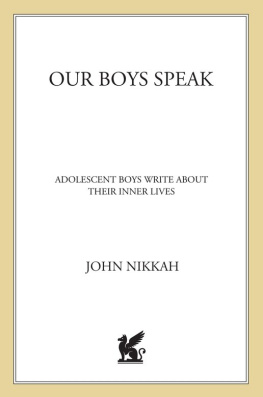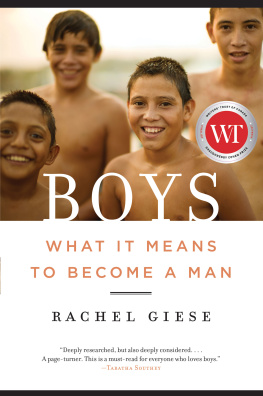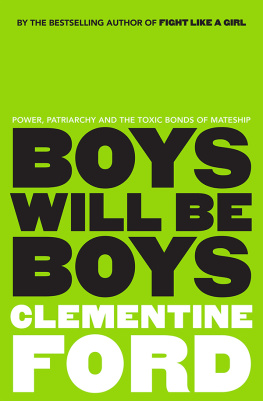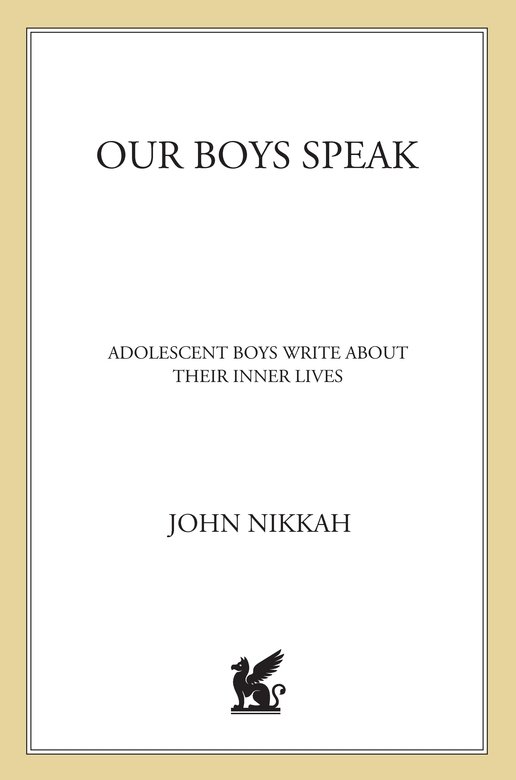This book could not have been written without the foresight and dedication of my editor, Joe Veltre. Another person whose help and commitment I couldnt have done without is Leah Furman, who worked alongside me from beginning to end. I would also like to thank my agent, Giles Anderson, for having faith in my ability to get the job done. Mira Furman and Elina Furman should also be credited for lending a helping hand with the mailings and transcriptions. Their help was invaluable.
I would also like to thank my friends Mitch Rovner and Bobby Piero, whose advice I could always count on, and especially my parents, whose support throughout my life has helped me achieve things I never thought possible.
Finally, I would like to thank all of the boys who contributed to the book, and the teachers who took time out of their busy schedules to encourage their students to express themselves.
Raised in Scarsdale, New York, JOHN NIKKAH earned his B.A. in psychology from the University of Illinois at Urbana-Champaign in 1996. There he served as an interfraternity peer counselor, and has since gone on to pursue a masters in psychology at the New School of Social Research in New York City. He will be receiving his masters degree in spring 2000, and is planning to pursue a Ph.D. in clinical psychology in the fall.
LEAH FURMAN lives and writes in New York City. She has written more than fifteen books.
AS I LOOKED over the selections included in this book one last time, an old adage kept popping into my head: Boys will be boys. I had always heard people saying this, but could never figure out just what they meant. If they were trying to say that boys will always get into fights, have the emotional maturity of two-year-olds, and be incapable of sustaining relationships, well, then they were wrong. But if their words were meant to convey the fact that boys are hurting, crying out, trying to fit in, and dealing with a myriad of issues such as peer pressure, friendship, racial conflict, and violence, then they were right onboys will be boys.
Through writing about my past and reading these poignant letters, many of which even brought a tear to my eye, I discovered that I am glad that boys will always be boys. I am glad that boys will always defy our expectations. I am glad that boys will always try to rise above their circumstances. I am glad that boys do stand up for themselves. I am glad that, if given the chance, boys will always speak out.
For a long time, I was silent about the trials and tribulations of my wonder years. I kept it all inside, and never thought that I would one day share my experiences with the world. To tell you the truth, I never considered my life important enough to document. After all, who was I? Just a young boy trying to findmy way in the world. Along the journey to making this book a reality, I learned that I had something of value to contribute. I learned that all of us, we boys, have to be proud of who we are and never stop talking about the experiences that shape our lives, our future, and the world around us.
Having mailed more than five thousand letters to schools, I was relieved when I received over six hundred responses from boys all over the country. Although I swore to my editor that I had no doubts that boys would write in, I was not as confident as I let on. When the replies started coming in, I couldnt believe just how many boys were willing to put themselves on the line and speak candidly about everything from first love to violence. If the experience of reading these many poems, essays, and stories taught me anything, its that there is something to be learned from every boy. Likewise, each of the letters in this book has something to teach us. All of them offer a glimpse into the well-hidden, but no less vital, emotional lives of teenage boys.
Of course, there are also those letters that can never be published. Despite my supplications and promises of strict anonymity, a few boys were either afraid or ashamed to share the thoughts theyd revealed to me with the outside world. One whod written about his family worried lest he disturb his ailing father, another, whod discussed school and popularity, feared that if his thoughts become public, he would no longer be safe in the hallways and locker rooms. Saddest of all were the circumstances of a boy whod written about the lingering effects of his first heartbreak. Having read his sons rather sentimental submission, the writers father flat out refused to let his son publish the touching workanonymous or otherwise.
Thus, the letters in this book are only a small sample of the many voices that are daring us to listen and react. They are not written by strangers you have yet to meet. The boys in this book are your next-door neighbors, your best friends, your brothers, and your sons. While I couldnt include all of thepieces I received due to the books limited space, it is with great humility that I extend my gratitude to all of the boys who participated in this project. I thank you for your honesty, your generosity, your courage, and most important, for just being boys.
In You We Trust
MANY OF YOU are going to be shocked by what Im about to say, just because it is an extremely uncommon sentiment, but here it goes: I cannot think of one bad thing to say about my parents.
Now dont get me wrong, its not as if theres never been any discord between us. Sure, weve had our share of disagreements, times when I would have gladly stomped out of the house or thrown a vase at the TV. But I never did do that. Why? Simply because I always knew that no matter what the subject of contention, my parents were always arguing from the viewpoint of what they thought was best for me. This made it very difficult ever to stay mad at them for too long.
The truth is that in their relationship with me, my parents have always behaved in the most unselfish manner. For as far back as I can remember, whenever I needed anything, whether it was a ride to soccer practice, help with my schoolwork, or advice on a relationship I was in, they were there for me. Forever putting my needs before their own, my parents acted as if they couldnt truly be happy unless I was.
However, having parents who fit the above profile does haveone main drawback. In a word, guilt. Were talking capital G guilt, colossal with a capital C guilt. No two ways about it, since I had the ideal parents, I had to be the ideal son. That meant never getting into trouble at school, never hanging out with the wrong crowd, and always striving to achieve the best grades.
On the rare occasion that I did transgress the boundaries defining my self-imposed perfection, I suffered great anxiety. The only way to relieve myself of these feelings was to push myself harder and make my parents proud. In essence, the avoidance of guilt acted as the main motivation for my academic and social successes. Anytime I would find myself in circumstances that involved making an important decision, whether it was to take drugs, get into a car with someone who had been drinking, or simply procrastinate when I had to study for finals, I always thought of my parents. What would they want me to do? How would they feel if something harmful happened to me?
Answering these questions was never too difficult; the hard part was actually conforming my behavior to them. Although Ive been known to stray from the path that bore my parents seal of approval, most of the time my course of action has been in tune with their wishes. Frankly, I could not bear to think of the heartache my parents would experience if one of my decisions had had ill-fated consequences. The notion that constantly haunted me when presented with a risky proposition was My parents have always done their best for me, and this is how I repay them.






